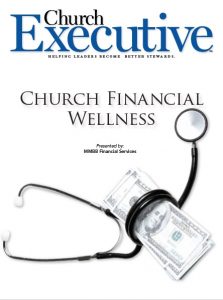
By Rev. Melody S. Chartier, CFP®
Anyone who is fortunate enough to receive an inheritance, whether it is large or small, can understand that it brings them unexpected opportunities — but not everyone will recognize that it also can present some challenges.
 The Boston College Center on Wealth and Philanthropy projects that the parents of baby boomers, and boomers themselves, will leave wealth and assets worth at least $41 trillion — and possibly as high as $136 trillion — to family and philanthropy over the next 47 years. That means that many people will find themselves on the receiving end of an inheritance.
The Boston College Center on Wealth and Philanthropy projects that the parents of baby boomers, and boomers themselves, will leave wealth and assets worth at least $41 trillion — and possibly as high as $136 trillion — to family and philanthropy over the next 47 years. That means that many people will find themselves on the receiving end of an inheritance.
No matter how the inheritance comes about, the initial excitement and thankfulness might be coupled with feeling overwhelmed by the responsibility to be discerning in the way you use it, out of respect for the person(s) who made the gift possible.
Are you prepared to deal with an inheritance?
For most people, the answer is “no.” Here are five tips to help you manage your newfound wealth wisely:
#1: Take your time
Grieve and heal before you make any decisions. Although it is possible to receive an inheritance from a person who is living, an inheritance almost always comes as a result of the death of a loved one. This is a very emotional time.
One of the best things that you can do is “park the cash.” Deposit the money into a savings account or another safe investment for a length of time between one month and one year to allow yourself time to heal before you make any major financial decisions.
#2: Consider your financial goals
Invest in your future. Before deciding what to do with your inheritance, you should take a look at your short-, mid- and long-term financial goals. Take the amount of money that you have inherited and figure it into your total financial picture; then, try to allocate part of it to each of your goals.

In the short-term, you might want to spend a portion of the money on something that will improve your quality of life now, such as a new car or a home. Keep in mind your medium- and long-term goals — such as helping your children pay for college and funding your retirement. Using part of the money to boost your retirement savings is one of the best ways to guarantee that your inheritance has a positive, long-term effect on your life.
#3: Develop a plan
Consult a financial expert. No matter the amount of your inheritance, it is a smart idea to contact a financial planner for advice on how to understand and manage your inheritance.
Not all inheritances are in the form of cash; oftentimes, you will receive stocks, bonds, life insurance, retirement accounts and property. With these types of inheritances, you might be faced with considerable federal and / or state inheritance taxes.
Working with a financial expert or tax professional will enable you to arrange for the sale of any assets and deal with the tax implications.
#4: Pay down debt
Look at your debt strategically, and pay off only “bad” or high-interest- rate debt, such as credit cards, student loans, personal loans and car loans. You might not want to pay off your mortgage, since you might realize tax benefits on the interest payments.
Consider funding an emergency savings account with at least six months’ worth of living expenses so that you will not have to rely on credit in the future.
#5: Do something for yourself
Set aside a small amount from your inheritance — perhaps 5% to 10 % — to spend on something special. Perhaps a new car or a family trip. Just remember what your inheritance is worth, and avoid the tendency to overspend.
A sizable inheritance can represent a life-changing opportunity when it is prudently managed. And for many of us, it is a once-in-a-lifetime gift that we do not want to squander.
The loss of a loved one often makes us think about our own mortality and the legacy that we would like to leave behind. There are many ways to accomplish this, such as remembering the person that left you the money by contributing to a charity or setting up a trust or foundation.
It is also the perfect time to think about your own estate and the plans you need to make in order to leave an inheritance for your loved ones. As you consider how best to use your inheritance, let it serve as a reminder to be sure your will is up to date and that you have designated beneficiaries for any accounts you have.
Rev. Melody S. Chartier is a CERTIFIED FINANCIAL PLANNER™ who has devoted her professional life to serving church-related organizations. Before joining MMBB, she served as director of affinity and multicultural programs at Brown University and as director of the annual fund and church relations at Andover Newton Theological School in Massachusetts. She received her Master of Divinity degree from Colgate Rochester Divinity School in New York and her B.A. from Eastern University in Pennsylvania.


